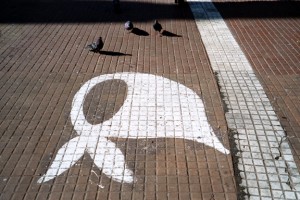
The white handkerchief of the Plaza de Mayo
Like Christopher and 20 million other waterlogged Northeasterners, I am a bit nonplussed by the Biblical rains of late. Forget an ark–I just want shoes that don’t leak.
Instead of going for Christopher’s donut fix, however, I am trying to use a little historical perspective to remind me that rain or no rain, offshore drilling in the eastern Gulf or not, life is good here.
And for that, I need little more than to remember my trip last week to Argentina, where last Wednesday was National Day of Memory (El Día Nacional de la Memoria por la Verdad y la Justicia, for those of you keeping score at home). As with so many Memorial Days, the implied memory was not of that one really great summer day back in 1992 where they got high for the first time and kissed that cute girl from homeroom. No, rather, Memorial Days are somber days, and in Argentina, they are memories of things that happened not very long ago and are still not nearly over.
I had the privilege of spending much of the Day of Memory with Argentine journalist Uki Goñi, who had a somewhat terrifying front-row seat (as a journalist for the Buenos Aires Herald) on the Dirty War, in which the Argentine government killed tens of thousands (20,000? 30,000?) of its enemies (students, leftists, Jews, psychiatrists, and anyone else deemed oppositional) from 1976 to 1983.
I’m not the person, and this is not the place, for a primer on the Dirty War. For that, there’s Wikipedia. Or, if you read Spanish, check out Uki’s book on the young naval officer who betrayed a group of grieving mothers and had many of them killed (or his more recent bestseller in English about the plot that brought Nazis to Argentina after the war).
As a parent, though, I find that the most fascinating thing about the Dirty War, and the efforts to memorialize it, is how traumatic it was for families. The enduring symbols of the victims are the Mothers of the Plaza de Mayo, a group of women who would gather in the square across from the interior ministry while waiting for their case numbers to be called so they could ask what had happened to their young children who had been “disappeared.” Since any type of public assemblage was outlawed, they wore white handkerchiefs to identify themselves to each other.
Though its founders were murdered, the group reformed and still marches today, still looking for answers they’ll likely never get. Unfortunately, they are represented these days by the shrill Hebe de Bonafini, who, like some of the 9/11 widows, wades too far into the politics of the day.
The Grandmothers of the Plaza de Mayo, though, had a different mission: They were the parents of women who were pregnant when they were taken prisoner. Being good Catholics, the military junta would not kill a fetus, so they allowed the children to be born before killing the mothers. The orphaned babies were then adopted by junta sympathizers and military families who wanted babies of their own.
Such a perverse scenario, and one which still raises discomfiting questions of identity and parenting today. To whit: the grandmothers’ group pushed for–and won–a law that forces adopted children (who would be about my age now) to give DNA samples so it can become clear whether they were the children of prisoners or not.
But would you want to know? If you had been raised by a family for 30 years–your whole life–would you want to find out that the people you call your parents had actually just harvested you from your birth parents before they were murdered by the government?
The DNA law is thought to specifically be targeting the adult children, adopted in 1976, of media titan Ernestina Herrera de Noble. But her children don’t want to know if they were actually born to the disappeared. I don’t know that they should be forced to find out. Regardless of your sympathies in the war, it seems unfair to upend the lives of people who were at the time just innocents, just babies.
So there it is: your daily dose of horrifying moral choices that you will likely never have to face, as child or parent. I’m gonna go enjoy the rain some more.

I see your point Nathan, why upset these kids’ (or no longer kids) lives?
But. I’m one of those “the truth is always better” people. I look at the rights/desire of those granparents to find out what happened to their daughters’ children. How can they deny them that?
And I think about it from the viewpoint of the child. If it is me, if my dad, who I love and I see as a great guy, was really Hitler – well, I’d rather know than not know. As painful as it might be to find that out.
But yea, I’m really grateful that it’s not my decision to make.
Yeah, I suppose there could be a greater societal benefit to knowing exactly what had transpired. But I also look at it through the lens of regular adoption protocol, which ultimately says that the child has the right to initiate any search for their biological family or not (if I’m not mistaken). Though lord knows it’s not like the biological parents chose to give these kids up.
Pingback: A Week on the Wagon: Giving Thanks | DADWAGON